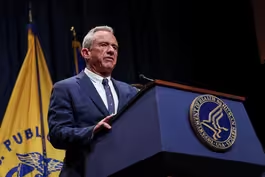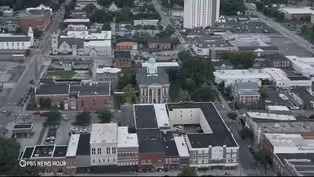
Politicians pick their voters with partisan redistricting
Clip: 8/6/2025 | 10m 18sVideo has Closed Captions
How politicians are picking their voters with partisan redistricting
Wednesday marks the anniversary of the Voting Rights Act, the law that ended the era of Jim Crow voting laws that blocked Black Americans from exercising their right to cast a ballot. But 60 years later, there’s renewed effort to give parties more control over the process by giving politicians more ability to pick their voters. William Brangham discussed more with Tony Plohetski and Rick Hasen.
Problems playing video? | Closed Captioning Feedback
Problems playing video? | Closed Captioning Feedback
Major corporate funding for the PBS News Hour is provided by BDO, BNSF, Consumer Cellular, American Cruise Lines, and Raymond James. Funding for the PBS NewsHour Weekend is provided by...

Politicians pick their voters with partisan redistricting
Clip: 8/6/2025 | 10m 18sVideo has Closed Captions
Wednesday marks the anniversary of the Voting Rights Act, the law that ended the era of Jim Crow voting laws that blocked Black Americans from exercising their right to cast a ballot. But 60 years later, there’s renewed effort to give parties more control over the process by giving politicians more ability to pick their voters. William Brangham discussed more with Tony Plohetski and Rick Hasen.
Problems playing video? | Closed Captioning Feedback
How to Watch PBS News Hour
PBS News Hour is available to stream on pbs.org and the free PBS App, available on iPhone, Apple TV, Android TV, Android smartphones, Amazon Fire TV, Amazon Fire Tablet, Roku, Samsung Smart TV, and Vizio.
Providing Support for PBS.org
Learn Moreabout PBS online sponsorshipGEOFF BENNETT: The Republican governor of Texas is asking that state Supreme Court to remove the legislature's top Democrat after Democrats left the state to block proposed changes to its congressional map.
And Democrats in blue states are threatening to redraw their own maps if Texas moves forward.
William Brangham is here with how this is all unfolding as the country marks a voting rights milestone -- William.
WILLIAM BRANGHAM: That's right, Geoff.
Today is the anniversary of the Voting Rights Act, which ended the era of Jim Crow voting laws that blocked Black Americans from exercising their right to cast a ballot.
But 60 years after its signing, there is renewed effort to give parties greater control over the process by giving politicians more ability to pick their voters.
Joining us now are Tony Plohetski of The Austin-American Statesman Rick Hasen, professor of law and political science at UCLA and author of "A Real Right to Vote."
Gentlemen, thank you both so much for being here.
Tony, I want to start with you first with what's happening in Texas.
Democrats have fled the state to try to stop the Republicans from redrawing these new maps, which they argue would unfairly tilt the state's congressional districts to the Republicans.
You went with some of those fleeing Democrats to Illinois.
What is your sense about how long those Democrats can hold out?
TONY PLOHETSKI, The Austin-American Statesman: William, they say they are deeply committed to remaining outside of Texas, outside the state lines, until at least August 19.
That is an important day, because that is the last day of the 30-day special session that was called by Governor Greg Abbott.
This was one of a number of things on the agenda, a number of items, including, William, flood relief.
Keep in mind that, of course, Texas had those devastating July 4 floods, and Democrats say that that is what should be taking precedent over any of the other issues on that legislative agenda.
In terms of what happens after August 19, that is one thing that they say they are continuing to examine among themselves, because it's important to note that the governor could easily call another special session.
WILLIAM BRANGHAM: So, Tony, staying with you though, Republicans, the governor and other members of the legislature, really ratcheted up their efforts to try to force the Democrats to come back.
Tell us a little bit more about what they have done and whether you think that will work.
TONY PLOHETSKI: Well, one of the things that has occurred is that the governor has actually filed a lawsuit with the Texas Supreme Court, arguing that the leader of the Democratic Caucus in Texas should be essentially thrown out of office.
That suit was filed and it is now making its way through the Supreme Court.
There is a big legal question about the legal underpinnings of the governor's petition.
But at the same time, there are also a number of other conversations that Democrats believe really don't hold a lot of weight, for example, this idea that the FBI could potentially become involved and arrest them and bring them back to Texas.
We have seen Republicans really sort of make those points.
But all of the experts we talk to say that much of what they are saying really is just seemingly political rhetoric that has no real basis in the law.
WILLIAM BRANGHAM: Rick Hasen, let's say that the Republicans succeed in their efforts and do redraw these maps.
What is your sense of what the practical implications that would mean for Republicans in Congress?
RICK HASEN, UCLA School of Law: Well, right now, of course, Republicans have a very narrow majority in the House.
This would be an attempt to try to keep that majority, despite the fact that we're going to be going to a midterm election where usually the party out of power, in this case the Democrats, would be able to gain seats.
Five seats might not be enough, but we're hearing that there may be movements in other states, including in Missouri and Indiana, to try and do the same thing.
This has prompted a kind of tit for tat from Democrats from California to New York to other states looking to do their own maximal gerrymandering.
It's kind of a race to the bottom.
It looks like Republicans probably have more seats that they could squeeze out if they pursue a maximal strategy than Democrats.
But it's really hard to know because every state's story is different in terms of how easy it would be to change the maps and how dangerous it would be for drawing maps that would maybe have very slim majorities for the majority party, in case there's a miscalculation, that that could mean actually helping the other party do better in the election.
WILLIAM BRANGHAM: I mean, as a scholar of election law, is it your sense that this really is the beginning, as you're saying, of a gerrymandering tit-for-tat war nationwide?
RICK HASEN: Well, I think you have to understand this in the context of what the Supreme Court has done over the last few decades.
So, for many decades, it was unclear if the Supreme Court would police the most egregious of partisan gerrymanders.
When Justice Anthony Kennedy was still on the Supreme Court, he left the issue open.
And so from 2004 until 2018, there were a number of cases brought where the Supreme Court basically said, not yet.
We're not sure what the rules going to be for partisan gerrymandering.
Justice Kennedy retired.
Justice Kavanaugh replaced him.
And in 2019, the Supreme Court said partisan gerrymandering presents such difficult issues for courts that federal courts are not going to police it.
And so this is, if not a green light, it's at least an indication to states that they have a lot more leeway.
They're still bound by the Voting Rights Act.
They're still bound by the Constitution in terms of certain other requirements for fair districts, but not -- the best way to defend yourself in court is to say, we are trying to maximize partisan advantage.
And it creates a really perverse incentive for really a race to the bottom where, the more political you are, the better the chance you are to have your maps upheld by the federal courts.
WILLIAM BRANGHAM: Tony, back to you.
Typically, redistricting happens every 10 years.
So what's happening in Texas is somewhat irregular in that time schedule.
I want to play a very sharp criticism by a Democrat in Texas of what the Republicans are doing.
This is Democratic Texas State senator Borris Miles.
Here's what he had to say.
STATE SEN. BORRIS MILES (D-TX): All it is, is another poll tax, another way to discriminate Black and browns from voting in the state of Texas.
But I want you to understand something.
It's not just Texas.
After Texas, it will be your state.
After your state, it'll be this entire country.
WILLIAM BRANGHAM: I mean, this is a very sharp criticism, basically arguing that what Republicans in Texas are trying to do is to go back to that era of the Jim Crow laws that blocked Black Americans from voting.
How do Republicans in Texas respond to those allegations?
And what do they say is the rationale for this redrawing?
TONY PLOHETSKI: They have not truly been very specific.
They point to, for example, a letter that the state received from the Department of Justice, raising questions about the current districts and the drawing of the current districts.
But, at the same time, Democrats point out that that letter could and perhaps should be litigated.
And, furthermore, they say the letter has no real findings to it and no real legal weight.
And so what they say is that Republicans have essentially gotten in a hurry improperly to redraw these district maps.
And, William, it's important to note that, until now, Republicans in Texas have steadfastly defended the current districts that are in place.
And there is this now about-face that is not fully or wholly explained, frankly.
WILLIAM BRANGHAM: Rick Hasen, I want to -- the same question to you.
We are, as I mentioned, the 60th anniversary of the Voting Rights Act.
And Democrats are making this argument that you just heard from that Texas state senator that Republicans are trying to roll the rights of voting Americans, particularly minority Americans, back.
Is that a fair criticism?
RICK HASEN: Well, I -- if you go back and look at the earlier litigation in Texas over the last few decades, in every set of redistricting, there have been findings that Texas has discriminated against Black and Latino voters.
The current maps, as we just heard, are being challenged on that basis.
And now there's going to be a further diminution of power of Democrats.
And what you have to understand is that minority voters, especially Black voters, still overwhelmingly favor the Democratic Party.
So when you discriminate against a Democratic district, you're almost always going to be discriminating against minority voters in Texas.
And so, if this map gets passed, there's going to be a challenge claiming that it violates Section 2 of the Voting Rights Act.
This itself is now going to be questionable, because, just last Friday, the Supreme Court put into play the possibility, almost on the exact anniversary, the 60th anniversary of the Voting Rights Act, that it might strike down Section 2 of the Voting Rights Act, which is the part of the Voting Rights Act that remains standing after the Supreme Court killed off the other part.
So we're coming into this maximal political power coming from these state legislatures, and we don't know if the Supreme Court is going to protect minority voters the way it has over the past few decades.
WILLIAM BRANGHAM: All right, that is Rick Hasen and Tony Plohetski.
Thank you both so much for joining us.
RICK HASEN: Thank you.
Composer reimagines Harvey Milk opera while rebuilding life
Video has Closed Captions
Clip: 8/6/2025 | 7m 46s | Composer reimagines his Harvey Milk opera while rebuilding life after traumatic injury (7m 46s)
Expert says mRNA funding cut is 'dangerous' health decision
Video has Closed Captions
Clip: 8/6/2025 | 7m 51s | Federal mRNA funding cut is 'most dangerous public health decision' ever, expert says (7m 51s)
Former prosecutor questions legitimacy of Bondi Russia probe
Video has Closed Captions
Clip: 8/6/2025 | 10m 29s | Former prosecutor questions legitimacy of Bondi’s Russia probe (10m 29s)
How a county is using AI to help people find common ground
Video has Closed Captions
Clip: 8/6/2025 | 9m 1s | How a Kentucky community is using AI to help people find common ground (9m 1s)
News Wrap: Army sergeant accused of shooting 5 soldiers
Video has Closed Captions
Clip: 8/6/2025 | 7m 17s | News Wrap: Army sergeant accused of shooting 5 soldiers at Fort Stewart (7m 17s)
Providing Support for PBS.org
Learn Moreabout PBS online sponsorshipSupport for PBS provided by:
Major corporate funding for the PBS News Hour is provided by BDO, BNSF, Consumer Cellular, American Cruise Lines, and Raymond James. Funding for the PBS NewsHour Weekend is provided by...
















